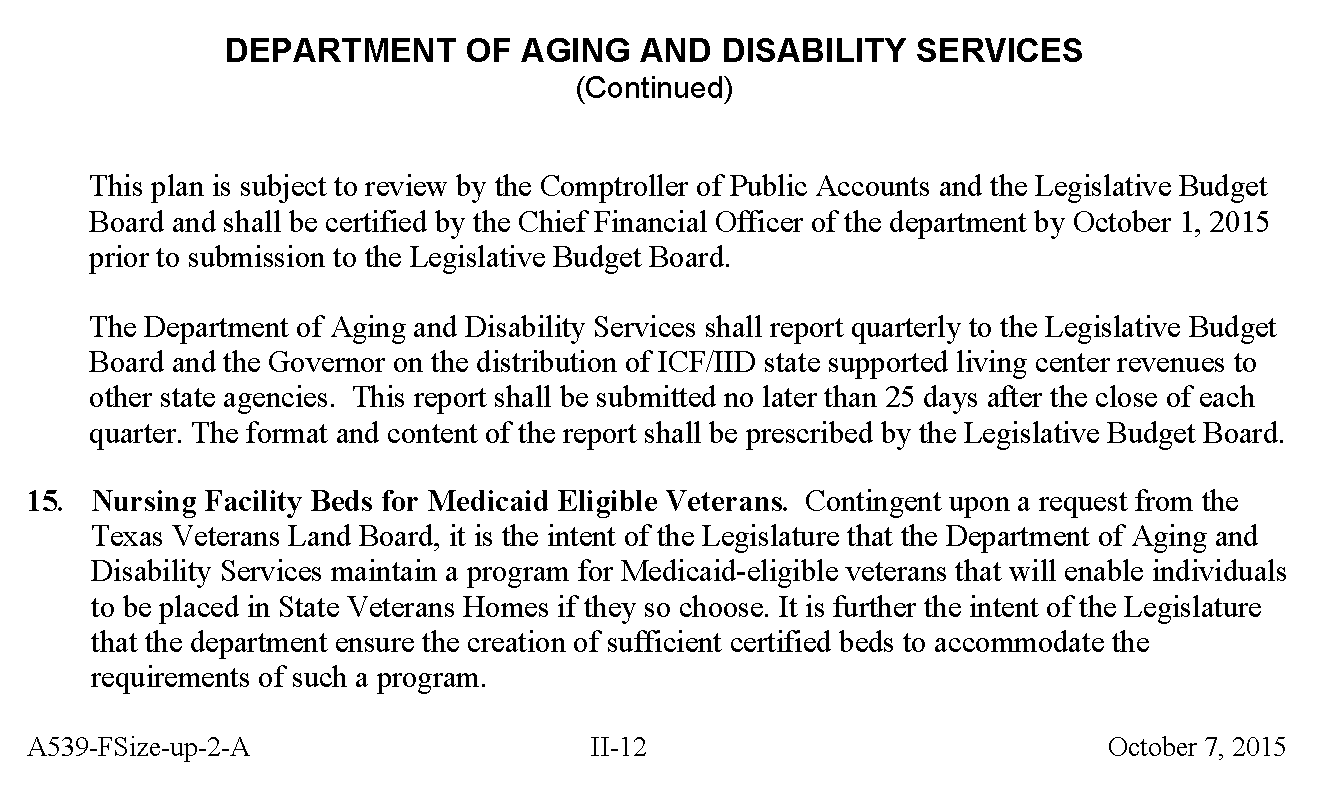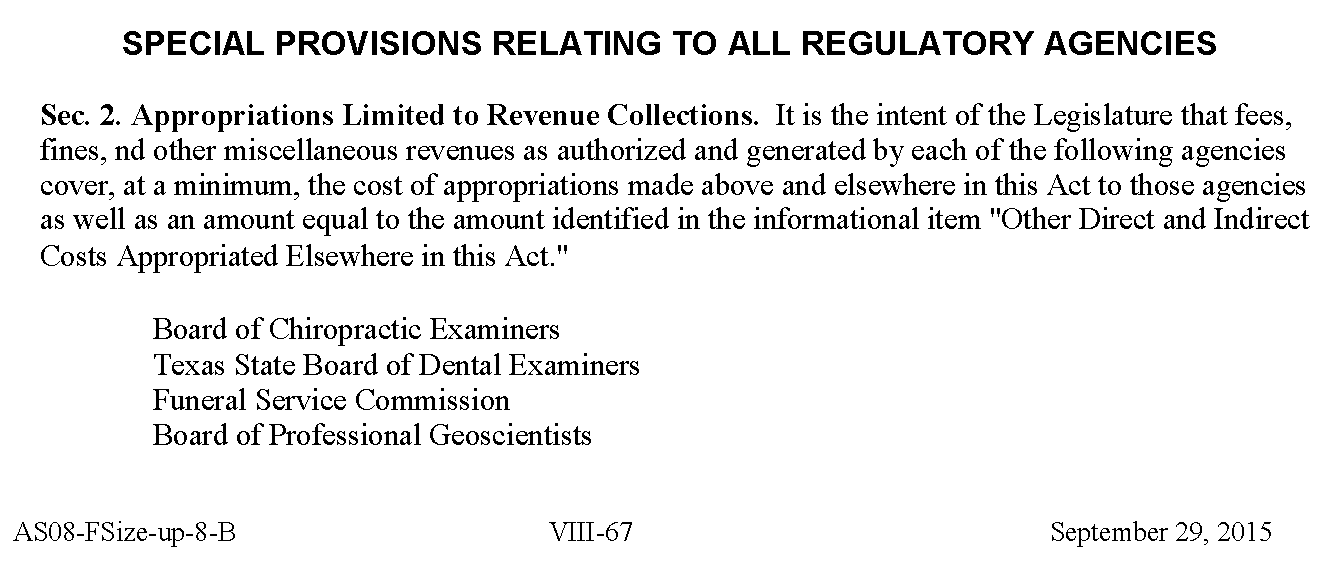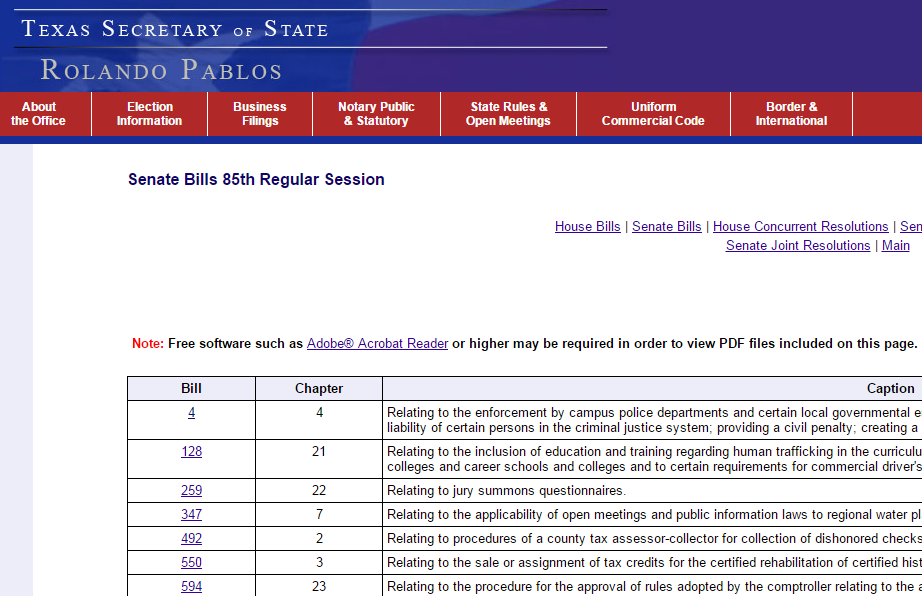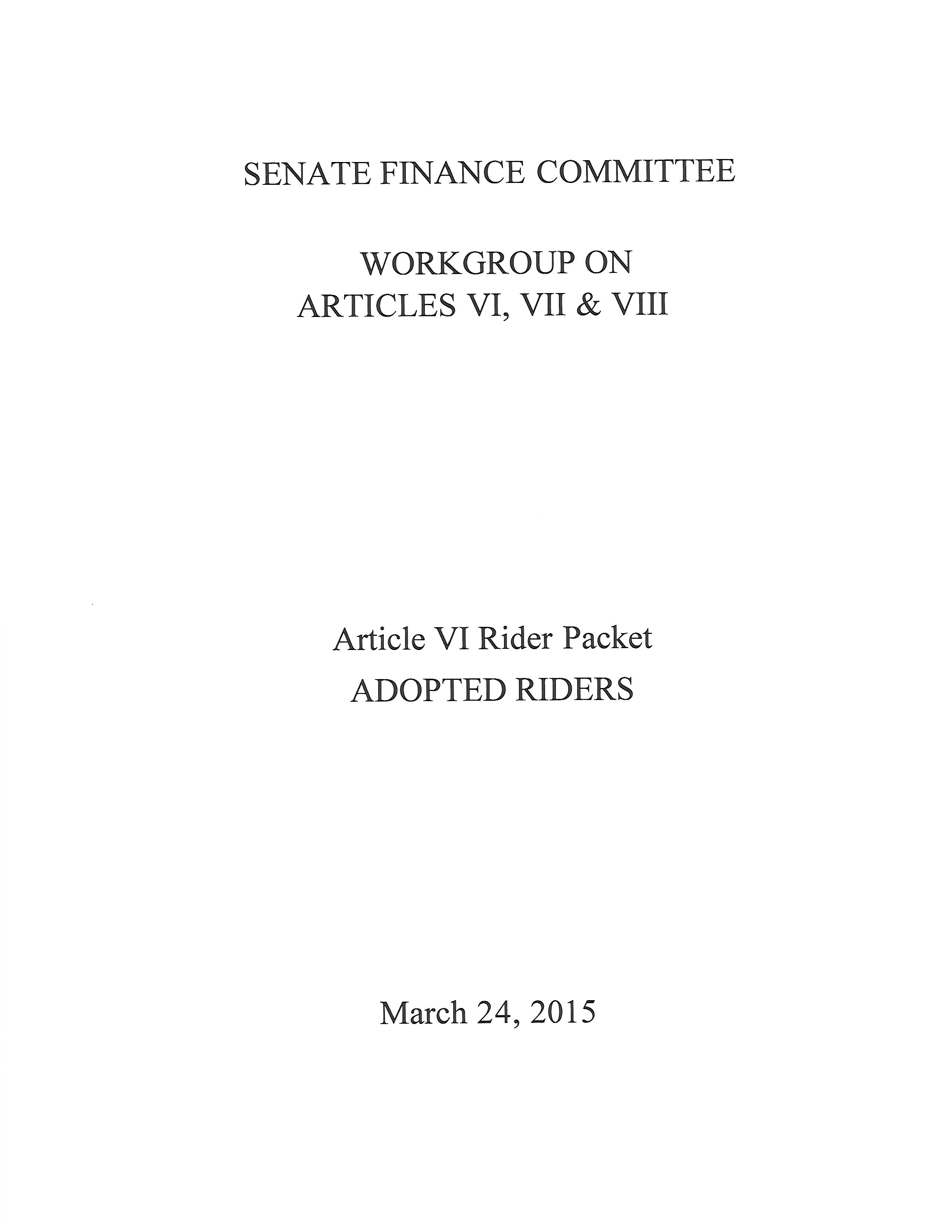|
House and Senate Bills
|
|
| Filed | 6,631 |
| Sent to the Governor | 1,208 |
| Signed by the Governor | 286 |
| Vetoed by the Governor | 0 |
| Filed without the Governor's signature | 28 |
| House and Senate Joint Resolutions | |
| Filed | 169 |
| Filed with the Secretary of State | 9 |
| House and Senate Concurrent Resolutions | |
| Filed | 202 |
| Filed with the Secretary of State | 13 |
| Sent to the Governor | 84 |
| Signed by the Governor | 42 |
| Vetoed by the Governor | 0 |
|
House and Senate Bills
|
|
| Filed | 6,631 |
| Sent to the Governor | 824 |
| Signed by the Governor | 190 |
| Vetoed by the Governor | 0 |
| Filed without the Governor's signature | 16 |
| House and Senate Joint Resolutions | |
| Filed | 169 |
| Filed with the Secretary of State | 7 |
| House and Senate Concurrent Resolutions | |
| Filed | 202 |
| Filed with the Secretary of State | 11 |
| Sent to the Governor | 50 |
| Signed by the Governor | 37 |
| Vetoed by the Governor | 0 |

Bill Statistics, 133rd Day
May 23
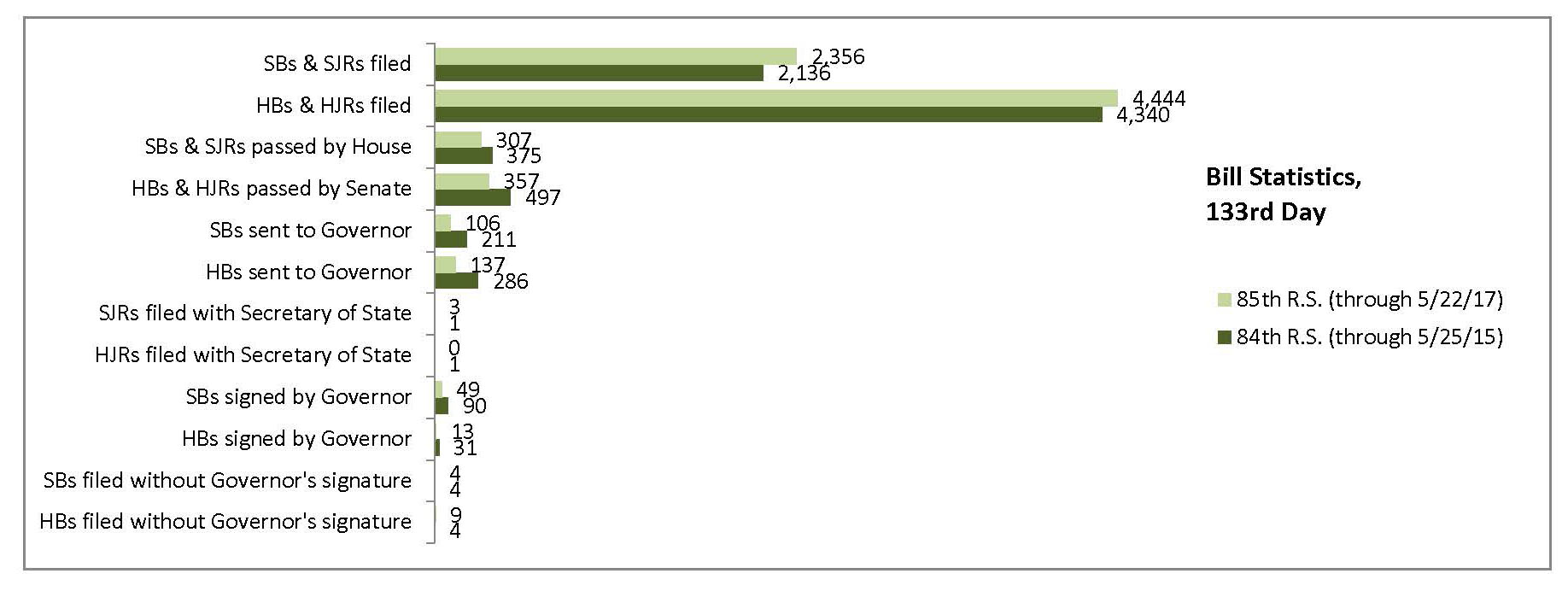
Bill Amendment FAQ
May 17
Please note that this post addresses amendments offered during committee or floor consideration.
What is an amendment?
An amendment is a change to a bill or resolution that is proposed either during committee or floor consideration.
During committee consideration of a bill, amendments can be offered by a member of that committee, whereas any member can offer amendments to a bill during floor consideration.
When can bills and resolutions be amended?
A floor amendment can be offered during second reading or third reading consideration of a bill. During the second reading of a bill, each amendment must be approved by a majority of the members present and voting to be adopted. However, a vote of two-thirds of the members present is required to adopt an amendment during the third reading of a bill.
Like floor amendments, a committee amendment must also be approved by majority vote of the chamber in which the bill is pending. A committee amendment is laid out and subject to debate on the chamber floor during the second reading consideration of the bill.
Where can I find information about amendments?
For amendments to current or recent legislation, use the Amendment Search on the Texas Legislature Online (TLO). This search tool allows you to use the following parameters to narrow your search results:
- Legislature
- Amendment Chamber
- Author
- Bill Number
- Reading
- Type
- Action
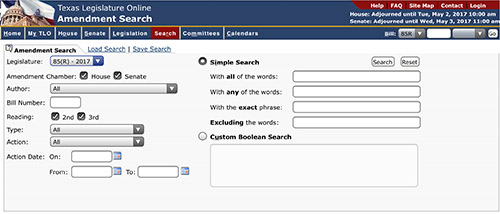 |
|
The "Amendment Search" engine on TLO is located under the "Search" tab.
|
The ability to search for text within an amendment is particularly useful to see if language from one bill has been added by an amendment to another bill.
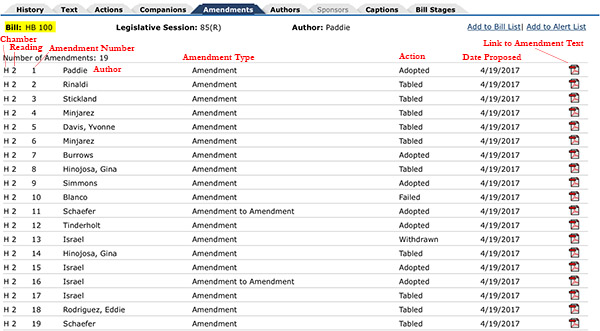 |
|
An explanation of the columns of information in the "Amendments" tab is provided above.
|
The "Amendments" tab in TLO contains more information about amendments, including the author of the amendment, amendment type, action, date the amendment was proposed, and link(s) to the amendment text.
The Current Amendment feature on TLO displays the text of amendments as they are considered on the House floor.
If you are conducting historical research about a bill, use the Legislative Archive System database and the collection of scanned House and Senate Journals to look for amendment-related information. Bill files, which can be found under the "Text" tab, contain adopted amendments, while journals contain all proposed amendments.
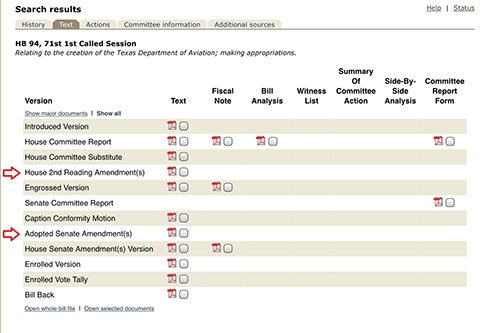 |
|
When using the Legislative Archive System, the bill file is located under the "Text" tab.
|
More information about amendments can be found in the following resources:
- Monday, May 22: Deadline for house to distribute last House Local & Consent Calendar with senate bills.
- Tuesday, May 23: Last day for house to consider second reading senate bills and senate joint resolutions on the House Daily or Supplemental Calendar.
- Wednesday, May 24: Last day for house to consider local and consent senate bills on second and third reading, and all third reading senate bills and senate joint resolutions on the House Supplemental Calendar. Last day for senate to consider all bills and joint resolutions on second or third reading.
- Thursday, May 25: Midnight deadline for house to distribute senate amendments.
- Friday, May 26: Last day for house to act on senate amendments. Midnight deadline for senate to print and distribute senate copies of conference committee reports on tax, general appropriations, and reapportionment bills.
- Saturday, May 27: Midnight deadline for house to distribute house copies of all conference committee reports. Midnight deadline for senate to print and distribute senate copies of all conference committee reports on bills other than tax, general appropriations, and reapportionment bills, and all house amendments to senate bills and joint resolutions that did not go to a conference committee.
- Sunday, May 28: Last day for house to adopt conference committee reports or discharge house conferees and concur in senate amendments. Last day for senate to concur in house amendments or adopt conference committee reports.
- Monday, May 29: Last day of the 85th Regular Session (sine die); only corrections may be considered in house and senate.
| House Bills (HB) & Joint Resolutions (HJR) | Senate Bills (SB) & Joint Resolutions (SJR) | |
| Filed | 4,444 | 2,356 |
| Reported out of committee | 1,915 | 1,003 |
| Passed by chamber of origin | 1,017 | 846 |
| Referred to committee in opposite chamber | 842 | 757 |
| Reported out of committee in opposite chamber | 160 | 339 |
| Passed opposite chamber | 82 | 88 |
| Sent to the Governor (bills only) | 21 | 55 |
| Signed by the Governor (bills only) | 1 | 5 |
- Wednesday, May 17: 9 a.m. Deadline for house to distribute its last House Local & Consent Calendar with local house bills.
- Friday, May 19: Last day for house to consider local house bills on second and third reading. First day senate can consider bills and resolutions the first day they are posted on the Senate Intent Calendar.
- Saturday, May 20: Last day for house committees to report senate bills and senate joint resolutions.
- Sunday, May 21: 10 p.m. Deadline for house to distribute its last House Daily Calendar with senate bills and senate joint resolutions.
| House Bills (HB) & Joint Resolutions (HJR) | Senate Bills (SB) & Joint Resolutions (SJR) | |
| Filed | 4,443 | 2,351 |
| Reported out of committee | 1,885 | 967 |
| Passed by chamber of origin | 769 | 747 |
| Referred to committee in opposite chamber | 355 | 446 |
| Reported out of committee in opposite chamber | 42 | 144 |
| Passed opposite chamber | 13 | 38 |
| Sent to the Governor | 1 | 7 |
| Signed by the Governor | 1 | 3 |
As the 85th Legislature draws to a close, a series of end-of-session deadlines begin to take effect. Below is a list of deadlines that occur next week:
- Monday, May 8: Last day for house committees to report house bills and house joint resolutions.
- Tuesday, May 9: Deadline for house to distribute last House Daily Calendar with house bills and joint resolutions.
- Wednesday, May 10: Deadline for house to distribute last House Local and Consent Calendar with consent house bills.
- Thursday, May 11: Last day for house to consider house bills and joint resolutions on second reading on House Daily or Supplemental Calendar.
- Friday, May 12: Last day for house to consider consent house bills on second and third reading and all third reading house bills or joint resolutions on House Supplemental Calendar.
Bill statistics for the period of Nov. 14, 2016 - April 30, 2017 are below.
| House Bills (HB) & Joint Resolutions (HJR) | Senate Bills (SB) & Joint Resolutions (SJR) | |
| Filed | 4,441 | 2,346 |
| Reported out of committee | 1,535 | 824 |
| Passed by chamber of origin | 381 | 581 |
| Referred to committee in opposite chamber | 76 | 132 |
| Reported out of committee in opposite chamber | 1 | 37 |
| Passed opposite chamber | 1 | 7 |
| Signed by the Governor | 0 | 0 |
Understanding Budget Riders
Apr 24
